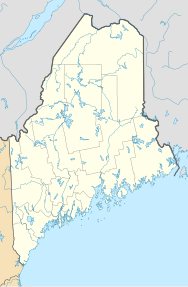Waterboro, Maine
| Waterboro, Maine | |
|---|---|
| Town | |

Little Ossipee Lake
|
|
| Location within the state of Maine | |
| Coordinates: 43°36′15″N 70°42′59″W / 43.60417°N 70.71639°W | |
| Country | United States |
| State | Maine |
| County | York |
| Incorporated | 1787 |
| Area | |
| • Total | 57.16 sq mi (148.04 km2) |
| • Land | 55.33 sq mi (143.30 km2) |
| • Water | 1.83 sq mi (4.74 km2) |
| Elevation | 797 ft (243 m) |
| Population (2010) | |
| • Total | 7,693 |
| • Estimate (2012) | 7,743 |
| • Density | 139.0/sq mi (53.7/km2) |
| Time zone | Eastern (EST) (UTC-5) |
| • Summer (DST) | EDT (UTC-4) |
| ZIP code | 04087,04061,04030 |
| Area code(s) | 207 |
| FIPS code | 23-80530 |
| GNIS feature ID | 0582793 |
| Website | www |
Waterboro is a town in York County, Maine, United States. The population was 7,693 at the 2010 census. It is part of the Portland–South Portland–Biddeford, Maine metropolitan statistical area.
The town includes the districts of North (04061), South (04087), and East (04030) Waterboro, in addition to the largest development in southern Maine, Lake Arrowhead Community. The introduction of Maine subdivision regulation, and Maine Planning Boards, is the direct result of the creation of the largest subdivision, Lake Arrowhead Community. The reaction of the Maine State Legislature was mandatory Planning Boards, and subdivision regulation.
Abenaki Indians called the area Massabesic, meaning "the place of much water", a reference to the region's lakes. It was part of an extensive tract of land purchased in 1661 by Major William Phillips of Saco from Chief Fluellin. Known as Massabesic Plantation, it included most of modern-day Waterboro, Alfred and Sanford. Phillips died in 1683, and the plantation eventually passed from his heirs to 10 proprietors. One of those proprietors was Colonel Joshua Waters, for whom the town would be named.
Lumbering began to thrive there about 1764. Captain John Smith from Kittery was the first permanent settler, arriving in 1768. On March 6, 1787, the Massachusetts General Court incorporated the township as Waterborough. In 1790, Old Corners became the site of the Court of General Sessions, although in 1805 the county seat shifted to Alfred. In 1895, the name was shortened to Waterboro.
...
Wikipedia

